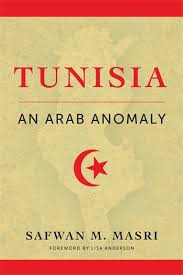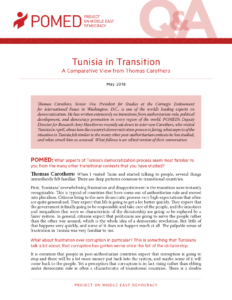 While Tunisia’s eighth anniversary celebrations of the end of the Ben Ali dictatorship were marred by social protests, opinions differ about the country’s state of political development as it gears up for its second parliamentary and presidential elections since the adoption of the new constitution in 2014, according to regional experts Max Gallien and Isabelle Werenfels.
While Tunisia’s eighth anniversary celebrations of the end of the Ben Ali dictatorship were marred by social protests, opinions differ about the country’s state of political development as it gears up for its second parliamentary and presidential elections since the adoption of the new constitution in 2014, according to regional experts Max Gallien and Isabelle Werenfels.
While some consider its democratization to be virtually complete, others fear a relapse into autocracy, they write in Is Tunisia Really Democratizing? Progress, Resistance, and an Uncertain Outlook, an article for the Stiftung Wissenschaft und Politik (the German Institute for International and Security Affairs, SWP):
Despite its considerable democratic achievements, Tunisia is in danger of developing into a hybrid system: part democratic, part authoritarian. This is not only due to the difficult economic and regional context. Critically, the political, economic and administrative networks of the old system, as well as persistent authoritarian practices and “old” rhetoric in politics and society, complicate the deepening of its fragile democracy. Tunisia’s international partners should make it their explicit objective to weaken these counter-currents.
 Against this backdrop, Tunisia’s German and European partners and the international donor community have an interest in curbing the counter-currents described above. To prevent Tunisia from getting mired in a hybrid system, they make the following recommendations for external actors:
Against this backdrop, Tunisia’s German and European partners and the international donor community have an interest in curbing the counter-currents described above. To prevent Tunisia from getting mired in a hybrid system, they make the following recommendations for external actors:
∎ Continue to set political priorities, even if the discourse increasingly focuses on the economic and security situation. This should include the independence of the judiciary and administrative reforms.
∎ Help defend the freedom to operate for watchdog organizations, journalists and civil-society associations.
∎ Promote diversity within civil society and above all in the press, and counter public-opinion monopolies by supporting platforms for critical and minority voices.
∎ In both political and economic cooperation, insist on official channels, rule-based work, and transparency.
∎ Critically examine the role of individual actors, organizations or state bodies (including partners of German foundations) in Tunisia’s political development and openly address problematic networks, practices and rhetoric.
∎ Appeal to political leaders’ sense of responsibility and ask for reliable evidence when they make serious accusations, for example of attempted coups.
 Conversely, it would be advisable for Tunisia’s international partners to avoid the following in the interests of greater democratization, they add:
Conversely, it would be advisable for Tunisia’s international partners to avoid the following in the interests of greater democratization, they add:
∎ Rely on non-transparent networks, including for economic or political cooperation, even if they promise short-term advantages.
∎ Describe and treat Tunisia’s democratization as successfully completed.
∎ Adopt the prevailing rhetoric uncritically.
∎ Make unrealistic comparisons for drama or embellishment – comparisons to Libya and Syria, or to European model democracies are not an appropriate yardstick. RTWT
Graphics from the Project on Middle East Democracy [POMED – a partner of the National Endowment for Democracy].







